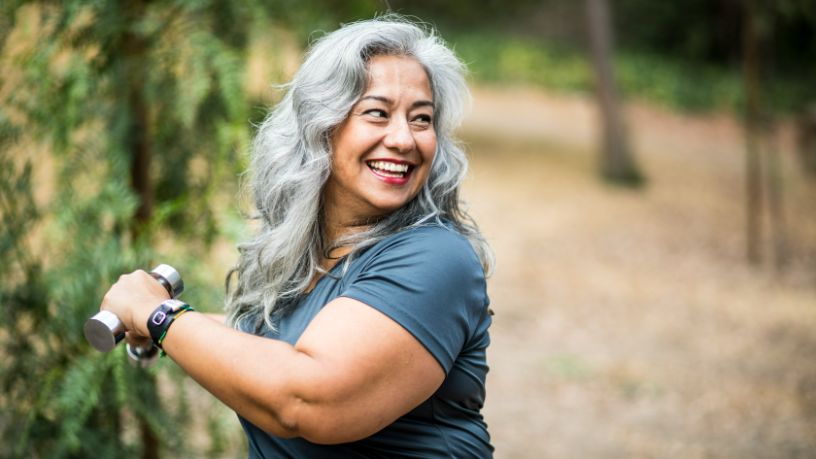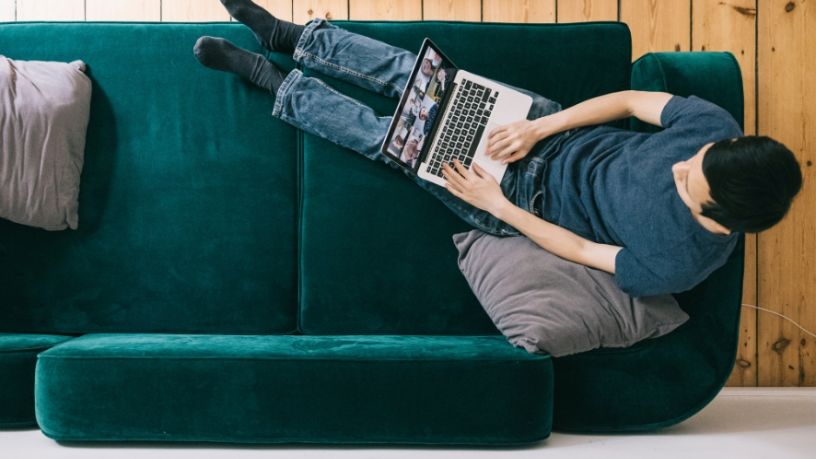Social media can have unfortunate effects on our mental health.
Key takeaways
The wide-spread use of filters and editing apps can impact on your body image.
Discover helpful tips for making your social feed more body positive.
Years ago, magazines were the main promoters of unattainable bodies, with issue after issue of photoshopped models. Then came the smart phone, and with it photo and video filters.
Today, artificial intelligence has taken airbrushing to a whole new level of unreality.
Filters can transform your face in real time, smoothing your complexion, whitening your teeth, darkening your eyebrows and modifying anything else you can imagine.
It’s become harder than ever to tell what’s real and what’s fake online.
Filters are designed to hide perceived imperfections to, some say, put your best digital foot forward. But how do they affect your body image?
Here, we look at the ugly side of social media and offer tips for designing a social feed that actually makes you feel great.
How filters affect self-esteem
Multiple studies have demonstrated that social media posts can set unrealistic expectations of body image, which may lead to feelings of inadequacy and low self-esteem.
In fact, research shows that young women in particular negatively compare their appearances to others online.1
A survey of almost 1,500 teens and young adults found the photo sharing platform Instagram was the most damaging social media site for mental health, body image and wellbeing.2
As one survey respondent put it: “Instagram easily makes girls and women feel as if their bodies aren’t good enough as people add filters and edit their pictures in order for them to look ‘perfect’.”
A 2020 survey by UK charity Girlguiding found that half of the girls and young women surveyed (aged between 11 and 21) regularly use apps or filters to look better online. And 39% said they felt upset that they couldn’t replicate their online appearance in real life.3
In extreme cases, plastic surgeons have reported cases of patients asking for surgery to help them look like a filtered image of themselves, a trend known as ‘Snapchat dysmorphia’.4
Kids Helpline’s Tony FitzGerald says that young people regularly call the service with concerns about self-esteem, self-worth and body image because of social media images.
“They see images online and they try to emulate what they see,” says FitzGerald. “But no one can achieve that level of perfection because many of the images are fake or have been manipulated, or have been staged in a way that is not necessarily ‘natural’.”
“Instagram is the primary platform where those images are accessed by young people,” he adds. “We’re all aware of the power of the Instagram influencer.”
Taking control of your feed
The good news is you are in control of everything you consume on social media. And, with a simple touch of your screen, you can unfollow pages and profiles that don’t make you feel good.
FitzGerald says young people should be encouraged to think critically about what pops up in their social feeds.
“Knowing that what they’re looking at is not necessarily real, as most of these glamorised images have been manipulated in some way, shape or form,” he says. “And even if it is real, these people have likely been heavily made up and the image ‘staged’.”
“When they’re not in front of a camera, it’s very likely that these people are just like you. When you look around you at your family and friends it’s very likely that none of them are like the images you see online.”
Follow people who make you feel great
According to FitzGerald, young people are becoming a lot more discerning and sceptical about what they see online.
Campaigns like the #Filterdrop Challenge encourage people to embrace their imperfections and post real-life images on social media.
The idea, started by UK make-up artist and curve model Sasha Pallari, is to fill people’s feeds with more realistic images.
“Movements like this, which encourage more reality and less fakery, are a really positive thing,” says FitzGerald. “It’s so important to follow real people who make you feel great.”
“Try to follow other people online who have a much healthier and more normal aspect of life,” he adds.
The bottom line, FitzGerald says, is about being in touch with your feelings and seeking out things that make you feel good.
“If you're following certain content online and you’re having a negative reaction to it, then that might be a bit of a trigger to think: do I really need to follow that? What’s the worth of it?”
Building a positive body image
You don’t need to have flawless skin, sculpted abs or long legs to have a positive body image.
But, what do you need?
Kids Helpline says cultivating a positive body image comes down to how you feel about the way you look.
Instead of comparing yourself to unattainable images online, try focusing on the positives about your body and the life it lives.
“It’s about trying to flip that thinking and say: ‘I’m unique and there are positive aspects about me as a person, my own body and personality’,” says FitzGerald. “We need to catch those thoughts that are telling us negative things about our bodies and replace them with positive ones.”
If you’re struggling with your body image, you might further consider some offline strategies, like:
- doing things that make you feel great
- spending time with positive people
- writing a list of your positive qualities and reading it often
- loving and respecting your body for all it can do
- embracing the things that make you unique
- not comparing yourself to others
- knowing you are more than what you look like
- trying to catch negative thoughts and replace them with positive ones.
Resources
Kids Helpline has online resources for kids and parents on how to boost body image.
Beyond Blue offers 24/7 mental health information and support online and on the phone at 1300 224 636.

At Bupa, trust is everything
Our health and wellbeing information is regularly reviewed and maintained by a team of healthcare experts, to ensure its relevancy and accuracy. Everyone's health journey is unique and health outcomes vary from person to person.
This content is not a replacement for personalised and specific medical, healthcare, or other professional advice. If you have concerns about your health, see your doctor or other health professional.
1Fardouly, J., & Vartanian, L. R. (2015). Negative comparisons about one's appearance mediate the relationship between Facebook usage and body image concerns. Body Image, 12, 82-8.
2Royal Society for Public Health. (2017). Instagram Ranked Worst for Young People’s Mental Health. Royal Society for Public Health.
3Girlguiding. (2020). Girls fear criticism for being themselves. Girlguiding.
4Ramphul, K., & Mejias, S. G. (2018). Is "Snapchat Dysmorphia" a Real Issue? Cureus, 10(3), e2263.
You might also like...
5 ways to break the worry cycle and reduce anxiety
Anxious worrying can be destabilising. Discover 5 strategies to break the worry cycle, reduce anxiety and protect your mental and physical health.
How to fight perfectionism
Relentlessly striving for perfectionism is linked to depression and anxiety, but you can break the cycle and let go of the perfect trap.
What is gaslighting?
Gaslighting can be tricky to identify, so we’ve put together a guide to help you understand what it is, how it can affect you, and where to get help.
Your guide to winter wellness
It can be pretty tempting to let your healthy habits hibernate over the winter months, so we’ve put together some essential winter wellness tips.





